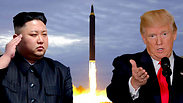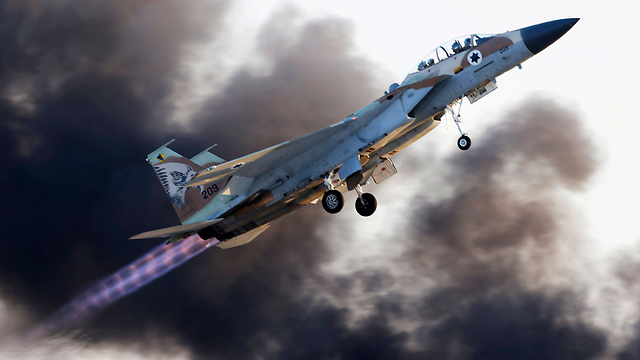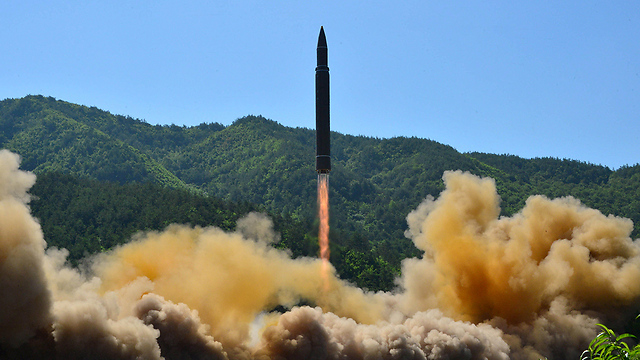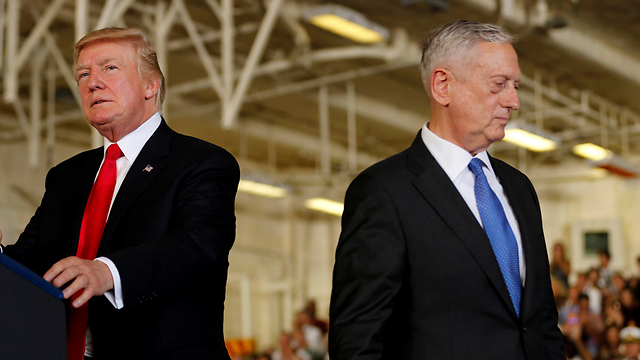

US tests nukes, as Trump says talks with N. Korea 'not the answer'
Two days after the US announces that it has tested an unarmed precise nuclear weapon, Pres. Donald Trump says talking with North Korea is 'not the answer,' raising fears over what might happen should the US fully abandon diplomacy attempts with the isolated dictatorship.
The US National Nuclear Security Administration (NNSA) announced earlier in the week that the US Air Force completed two tests of unarmed B61-12 nuclear bombs on August 8 at a test range in Nevada, intended to qualify the weapon for future service.
According to the NNSA, the tests—which involved the aforementioned bombs being dropped from a specialized F-15E Strike Eagle—"evaluated the weapon’s non-nuclear functions and the aircraft’s capability to deliver the weapon."

This is the second in a series of tests to qualify the weapon and the aircraft for military servic, which are expected to continue over the next three years. The first test took place last March, announced just a day after US forces in Afghanistan dropped the military's largest non-nuclear bomb—the MOAB—on an ISIS target in Afghanistan.
The announcement of the test, which drew condemnation from both US and Russia officials for escalating the risk of nuclear war, comes as communcations between the US President Donald Trump's administration and that of North Korean Leader Kim Jong Un become particularly tense, after North Korea threatened war on the US, if the US continues "provoking" it.
"The B61-12 life extension program is progressing on schedule to meet national security requirements," said Phil Calbos, acting NNSA deputy administrator for Defense Programs. "These realistic flight qualification tests validate the design of the B61-12 when it comes to system performance."
The B61-12, according to the NNSA, "consolidates and replaces four B61 bomb variants in the US' nuclear arsenal," with the first production unit "scheduled to be completed by March 2020." Both the NNSA and military analysts believe the weapon may drastically reduce civilian casualties and collateral damage due to its pinpoint accuracy.
In an interview with PBS NewsHour, former commander of US Strategic Command Gen. James Cartwright confirmed that the accuracy of the new weapon could make the president and heads of US national security less hesitant to use it.
"If I can drive down the yield, drive down, therefore, the likelihood of fallout, et cetera, does that make it more usable in the eyes of some—some president or national security decision-making process? And the answer is, it likely could be more usable," Cartwright said.
'Talking is not the answer'
Two days later, on Wednesday morning, Trump said that "Talking is not the answer" when it comes to North Korea, claiming the US has been paying North Koreans what he calls "extortion money" for decades."The US has been talking to North Korea, and paying them extortion money, for 25 years," Trump tweeted, adding: "Talking is not the answer!"
The tweet comes on the heels of the North’s recent missile test over Japan, a close American ally.
Trump’s tweet did not spell out what he meant by "extortion" in the current standoff over North Korea’s nuclear program, and the White House did not immediately respond to questions.
North Korea has in the past temporarily halted nuclear development when the US and others provided food aid or other types of compensation. But North Korea has not been making such demands, at least publicly, since Trump came into office. Instead, it has been focused on finishing its decades-long effort to master the technology for fitting a nuclear warhead on a missile that can strike the US mainland, calling such capability essential for its national defense.
Trump’s assessment about the need for dialogue also appears at odds with his top diplomat, Secretary of State Rex Tillerson, who had in recent weeks been softening the conditions for a possible, formal dialogue with Pyongyang. The US also has been maintaining a diplomatic back channel with North Korea.
Just hours after Trump's tweet, in an apparent attempt to douse the flames, US Defense Secretary Jim Mattis said that the US was not out of diplomatic solutions with North Korea.
When asked by reporters before a meeting with his South Korean counterpart at the Pentagon if the United States was out of diplomatic solutions with North Korea, Mattis replied this was not the case.
"We are never out of diplomatic solutions. We continue to work together, and the minister and I share a responsibility to provide for the protection of our nations, our populations, and our interests," Mattis added.
Trump offered a surprisingly subdued response to Pyongyang's latest missile test, avoiding a repeat of his bombastic warnings earlier this month of a potential military confrontation. In a terse written statement Tuesday, Trump said that, "All options are on the table"—a standard formulation signaling that Washington is not ruling out the use of military force.
For second time in two days, Trump spoke by phone Wednesday with Japanese Prime Minister Shinzo Abe about their "close cooperation" on efforts to address the launch, the White House said, without elaborating.
Meanwhile, US officials announced Wednesday morning that they had conducted a missile defense test that resulted in the successful intercept of a medium-range ballistic missile off the coast of Hawaii. The test was conducted by the Missile Defense Agency and US Navy sailors.
"We are working closely with the fleet to develop this important new capability, and this was a key milestone in giving our Aegis BMD ships an enhanced capability to defeat ballistic missiles in their terminal phase," Missile Defense Agency Director Lt. Gen. Sam Greaves said in a statement. "We will continue developing ballistic missile defense technologies to stay ahead of the threat as it evolves."
The Associated Press and Reuters contributed to this article.


















